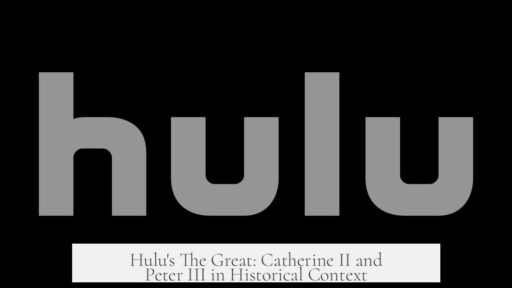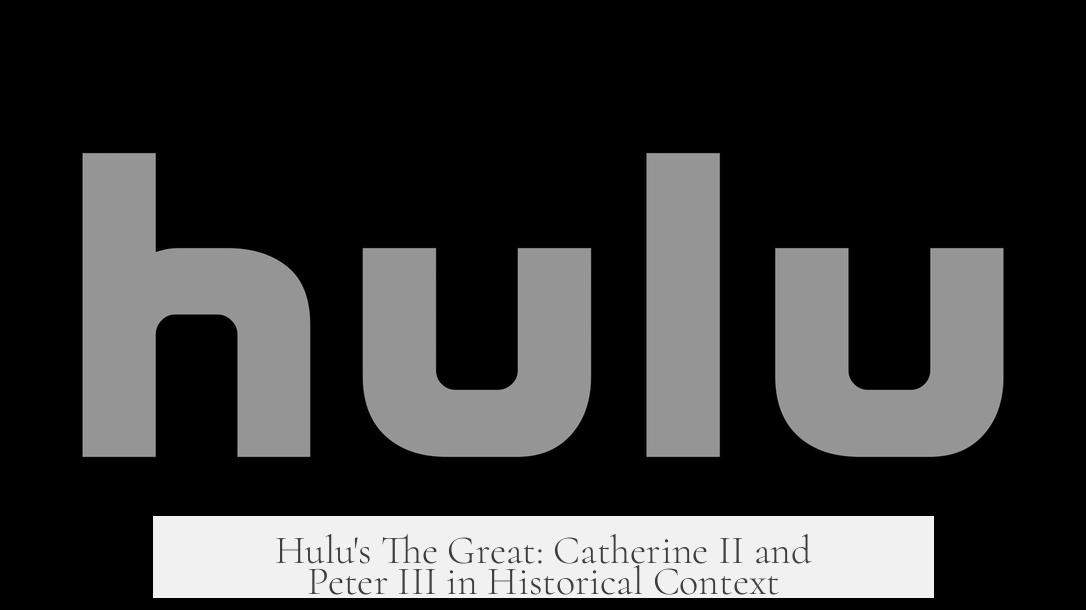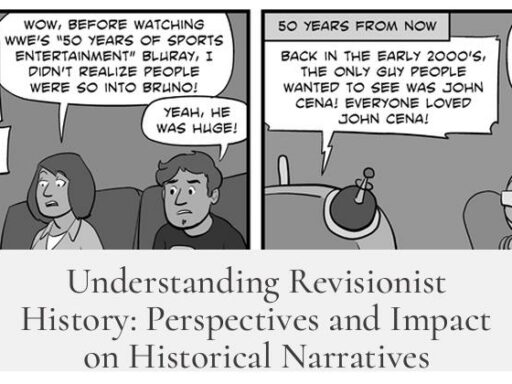The Hulu series The Great captures some basic truths about Catherine II and Peter III but takes wide liberties with historical facts. The show accurately names the main characters, shows their marriage, and portrays the coup that placed Catherine on the throne. Beyond these broad strokes, it prioritizes satire and dramatization over accuracy, intentionally deviating from history to entertain viewers.

Several glaring inaccuracies occur early on. The series implies Catherine met René Descartes, though he died more than a century before her birth. This is a clear historical error the show does not attempt to hide. Such whimsical liberties signal its general approach: playing fast and loose with timelines and facts.
The real Catherine and Peter were German-born second cousins who married young—she was 16, he was 17. Peter’s aunt, Empress Elizabeth, ruled for two decades, invited Peter to Russia at age 14 as her heir, and governed until her death. Peter III, contrary to claims that he was Elizabeth’s son or merely a figurehead, was her nephew and the grandson of Peter I. The couple’s marriage lasted 17 years, but Peter only ruled for six months before Catherine’s coup. During most of their time together, they had little political power, residing under Elizabeth’s court.

The series’ depiction of Peter III differs sharply from historical evidence. It shows him as a promiscuous, tyrannical figure, when in reality, he was weak, awkward, and subject to ridicule by courtiers. He focused obsessively on military matters and admired Frederick the Great of Prussia. He disliked Russian culture and preferred his native Holstein. His marriage with Catherine was reportedly unconsummated for years due to unknown causes; later, his relationship with his lover Elisabeth Vorontsova was likely platonic rather than sexual.
Politically, Peter enacted reforms related to nobility rights, religious tolerance, and secret police reforms. Catherine later confirmed many of these policies. His main controversies stemmed from foreign policy, particularly making peace with Prussia and waging war against Denmark to benefit Holstein. He was not the cruel or drunk caricature depicted but was often intoxicated and socially inept, disliked for his lack of refinement and disregard for court etiquette. Physically, he was thin, sickly, scarred by smallpox, and lacked the presence of his TV portrayal.
Catherine’s portrayal also diverges significantly from reality. The show presents her as naive and childlike early on, but she was ambitious, socially skilled, and aware of court politics from a young age. She traveled in German courts with her mother, developing important connections. Catherine aimed to rule through Peter initially, deciding to depose him only when he refused to share power and threatened divorce. Her reforms aimed as much to enhance her public image as to implement enlightenment ideals.
Elle Fanning’s youthful, innocent performance differs from the historical Catherine, who had a strong chin, confident demeanor, and considerable charm. Catherine had significant influence at court before becoming Empress. Many diplomats preferred negotiating with her rather than the ineffectual Peter. Correspondence before her seizure of power shows she was treated as the future sole ruler.
The depiction of the Russian court as backward contrasts with its historical reality under Empress Elizabeth. The court was heavily influenced by French culture, hosting universities, arts academies, theaters, and literary journals. The nobility practiced refined etiquette, while Peter’s coarse manners alienated them. Women also enjoyed considerable influence; Catherine was the fourth consecutive reigning empress, which was uncommon in Europe.
For those seeking accurate portrayals, the Russian TV series Ekaterina offers a more factual account despite occasional dramatic flourishes. The Robert Massie biography of Catherine is a highly recommended detailed and well-researched source. Notably, Ekaterina uses Russian throughout, though historically French was the preferred court language under Elizabeth.
| Aspect | Hulu’s The Great | Historical Reality |
|---|---|---|
| Catherine’s Age & Background | Naive, childish, exaggeratedly youthful | Ambitious, socially savvy German princess |
| Peter III’s Personality | Promiscuous bully, drunken tyrant | Weak, socially awkward, obsessed with military |
| Marriage | Consummated early, tumultuous | Unconsummated for years, political alliance |
| Court Culture | Backwards, crude | French-influenced, refined arts and etiquette |
| Reforms and Politics | Catherine interested mainly in reforms | Power and fame motivations, continued Peter’s reforms |
- Hulu’s The Great is only accurate in names, marriage, and the coup; much else is dramatized or incorrect.
- Peter III was weak but reform-minded, socially inept, not a villain.
- Catherine was ambitious, confident, and politically skilled from the start.
- The Russian court was French-influenced and culturally vibrant under Elizabeth.
- More accurate representations exist in the Russian series Ekaterina and Robert Massie’s biography.
The Great: Catherine II, Peter III, and What Hulu Gets Right
Wondering how accurate Hulu’s The Great really is about Catherine II and Peter III? Here’s the scoop: Hulu nails the names, the marriage, and the coup. But beyond that, it’s a wild ride through fiction. If you came expecting a strict history lesson, buckle up—what you get instead is a cheeky, loosely inspired drama.
The Great spins the story of Catherine the Great and her complicated, often awkward relationship with Peter III. But history is a lot more nuanced. Let’s unpack what the show gets right, what it misses, and why these quirks make it both frustrating and fun to watch.
When Fiction Meets History: The Big Picture
The main facts? Catherine and Peter married as teenagers, aged 16 and 17, and they were second cousins, both born in Germany. The show respects this basic outline. They married young and lived through a dramatic political upheaval.
But beware: the series tosses historical precision out the window on many counts. For example, in the first episode, Catherine remarks she met René Descartes. That’s science fiction, considering Descartes died over a hundred years before Catherine was even born. The show never pretends to be a textbook.
“The only things that are historically accurate,” as historians say, “are the main characters’ names, their marriage, and the coup.” Beyond that, you’re in for an entertaining, if wildly exaggerated ride.
Peter III: Not the Villainous Madman You Know
If Hulu’s Peter III is a boorish lout, a paranoid maniac with a messy personal life, history tells a subtler story.
He was heir to the throne for most of their marriage, but he only ruled for six months before Catherine’s coup. For years, Peter lived at the court of Empress Elisabeth, his aunt, with very little real political power. As such, his influence was quite limited.
Peter’s real-life personality was far from the monstrous figure on the show. He’s often described as weak and easily led. In fact, courtiers mocked him for his lack of sophistication. His passions were military drills and an obsessiveness with his hero Frederick the Great of Prussia.
Interestingly, Peter disliked many aspects of Russian culture, finding its church traditions strange and preferring his native Holstein. This distanced him further from the Russian elites and likely fueled their disapproval.
When it comes to Peter’s love life, the show’s portrayal of him as promiscuous doesn’t quite hold water. He reportedly struggled to consummate his marriage to Catherine for seven years. Historians debate whether this was due to physical or psychological reasons. In later years, he had a relationship with Elisabeth Vorontsova, but letters suggest it was mostly platonic. Also, his alleged lover was Catherine’s lady-in-waiting — a detail that contradicts typical soap-opera drama.
Politically, Peter wasn’t reactionary. Many of his reforms—reforms of the secret chancellery, promotion of religious tolerance, the rights of the nobility—were continued by Catherine, disproving the idea that they stood diametrically opposed in outlook.
His unpopularity was largely fueled by foreign policy: making peace with Prussia (his idol’s land) and waging war on Denmark to protect Holstein’s interests. These decisions angered many Russians.
Appearance wise, Peter was thin, scarred by smallpox, and more sickly than stately. Definitely not the rocking, larger-than-life figure portrayed by actor Nicholas Hoult. The real Peter was unrefined, clumsy in court manners, and disliked the gallant lifestyle.
Catherine II: Ambition, Charm, and Power
Now to Catherine—Hulu’s show paints her as naive and a little dim at the start. History begs to differ. Far from a clueless girl, Catherine was born into a socially ambitious family. Her mom toured German courts and taught Catherine the subtle art of diplomacy and charm.
She had sharp social skills from a young age and knew that her reputation at the Russian court mattered deeply—especially when compared against her weak husband. She quickly grasped the political game and aimed to rule alongside Peter.
Her decision to depose Peter wasn’t spontaneous or vindictive. It came after persistent frustration: Peter resisted sharing power and even threatened divorce. Only then did Catherine move decisively to seize control.
Catherine’s reforms were real and significant—she ruled for 34 years! But let’s set the record straight: her drive for reforms often mirrored her hunger for power and status. She sought the title of an enlightened ruler partly for prestige within Europe.
Actress Elle Fanning brings youthful energy to Catherine but misses her mature strength and steeliness. Catherine had a powerful chin, a proud stance, and considerable charm—she could manipulate and influence nobles and ambassadors alike. Documents show Catherine was a major political player even before she officially ruled.
The Russian Court: More French Elegance Than You’d Expect
One glaring misrepresentation is the depiction of the Russian court as uncultured and backward. In reality, under Empress Elisabeth’s reign (Peter and Catherine’s era), the court absorbed significant French influence.
The period saw the establishment of Russia’s first university and the Academy of Arts. Theater, opera, and literary journals blossomed. Courtiers were expected to be gallant and refined. Peter III’s rough-mannered behavior—smoking, drinking with soldiers—was looked down upon, reinforcing his outsider status.
Women in 18th-century Russia didn’t receive the best education, but Russian noblewomen wielded more political influence than many European counterparts. Catherine was the fourth empress in a sequence of four reigning women, proving female power was no rarity.
Recommended Sources for a More Accurate Picture
Hulu’s The Great leans heavily into entertainment. If you want historical accuracy alongside drama, check out the Russian series Ekaterina. It takes some liberties but is notably more faithful to history, especially in portraying Peter as a bit of a buffoon.
For readers hungry for deep historical insight, Robert Massie’s book on Catherine the Great offers comprehensive coverage. It blends biography and historical context with an engaging narrative.
One fun quirk in Ekaterina: since French was the primary language at the Russian court, characters speak French rather than Russian. In contrast, the series uses only Russian, an interesting—if minor—drop in historical accuracy.
What To Take Away?
The Great is a romp inspired by real history but not bound by it. If you want sharp drama and witty dialogue, it delivers. If you want strict adherence to facts, it’s not the show for you.
The characters of Catherine and Peter are complex, layered figures, not archetypes. Peter III wasn’t a crazed villain; Catherine was more than a naive girl. The Russian court was vibrant and cultured, not a chaotic mishmash of crude nobles.
Watching Hulu’s The Great? Enjoy the drama for what it is but keep a history book handy for the real story. Or just relish the irony when Catherine claims to have met René Descartes—it’s a cheeky nod that history isn’t their top priority.
So, will you watch The Great with a fresh perspective? Consider it historical fiction with a wink. For real facts and fascinating insight, dive into Ekaterina or a well-researched biography. History has plenty of drama without exaggerating, but sometimes exaggeration is what makes it so wildly entertaining.




